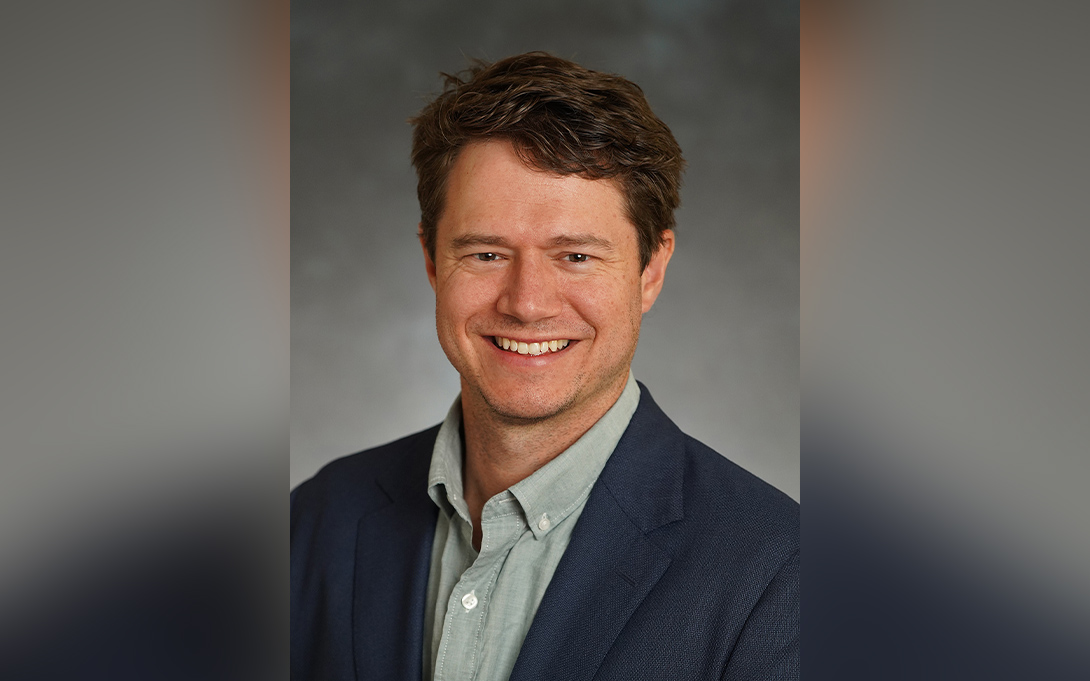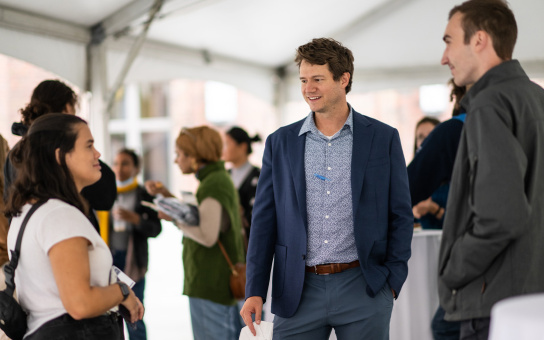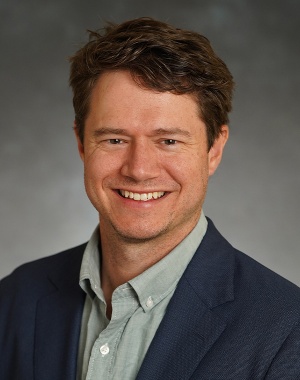
This fall, after a national search, the Ford School selected Peter Vasher as the school’s director of career services. Vasher has been with the school since 2017 and served as associate director of graduate career services for three years. During that time, he established deep connections with key professional policy networks and developed best-in-class programs to help students discover and navigate their career journey and enhance their professional skills. Vasher succeeds the estimable Jennifer Niggemeier, who has moved into the role of associate director for the Ford School’s Leadership Initiative.
State & Hill: You started your new role as the school year kicked off. How’s it going?
Peter Vasher: It’s been a busy fall semester for us, which is a good thing! One key goal has been to grow our services for undergrads, while maintaining our very strong support for graduate students. We started with investments in expanding our service delivery for undergraduates, and will be adding staff in early 2023. We had an open house to welcome our BAs, then we surveyed them on their interests and developed three fall focus areas in response–federal government, law, and consulting. We’ve been finding opportunities to map their interests and create skill development and alumni connections. Our other key strategic goal has been a focus on equity and inclusion in our services. We’re proud to be one of the most diverse schools on campus, including a large international student population. We’re posting a new career development position in January for someone who will work with both undergraduate and graduate students and bring a particular focus on services for international students, underrepresented students, first-generation students, and other key groups.

S&H: What lessons did the career team learn over the pandemic years in terms of strategy or tactics?
PV: I’d say that we’ve ‘leaned in’ wherever possible. We’ve found it easier now to bring in alumni voices from different parts of the world to advise and guide our students, for example. And we’ve expanded our employer connections thanks to virtual engagement. We’ve seen, too, an increase in remote internship opportunities during the school year with organizations based in DC or New York; prior to the pandemic, those employers would have only looked at local students. Most of all, we learned to be flexible and inclusive, to meet our students where they are. Right now, our students are at Weill Hall, and so we’ve seen greater in-person engagement compared to our peers on campus. But we’re still living in a hybrid world. If a student wants to meet virtually? Great. We make that happen. We may see in January when it gets cold, will we suddenly have a spike in virtual meetings! We’re set up to handle that. A quarter of our juniors will be studying abroad next semester, too, and we’ll keep working with them as well.
S&H: What role do data and metrics play in your team’s work?
PV: I think they’re paramount to our success, as it should be for a policy school! We may not use R or Stata like our students (laughs), but we definitely use data to help inform our strategy. We’re asking, what are our students’ aspirations and interests? Where have they gone from here? What are our traditional career pathways and pipelines of our undergraduate & graduate students? What does our historical picture tell us? Tracking and analysis is at the forefront of what we do to make intentional choices around our engagement with employers and our service delivery to students.
S&H: Any interesting workforce trends that you’re seeing for our graduate students?
PV: We’ve seen a shift in the last couple of years with more students going into the public service consulting space, and a slight decrease in government and nonprofit. I think that might bounce back here in the near future. And then there’s remote work: we’re still seeing a majority of our students in hybrid environments, and an increase too in students living in one state and working remotely for an organization in another. Across sectors, hybrid and remote work is still very much a reality even three years into a pandemic.
S&H: How do you describe Ford School students when you’re talking with employers?
PV: It’s very easy to talk about our students! They’re extremely accomplished–successful in the classroom and outside it. And they’re diverse, and bring so many different experiences and perspectives. Our international students this year come from 16 different countries! And then there’s just tremendous value to the experience and expertise that our students develop while they’re here. They’re making an impact across so many different organizations, sectors, and regions. Sometimes we don’t have to say much, because an employer has already hired and had a great experience with our students. They come to us for more!
S&H: How can BA alumni help you grow undergrad career services?
PV: We’ve now had 15 years of BA graduates and we want to tap into that expert network as we grow our BA career services. We’d really welcome all the help and input we can get, from participating in a panel discussion or volunteering for an alumni office hour, to helping us learn from their experiences and calibrate our services for early career folks. Please drop me a line at [email protected]!
More in State & Hill
Below, find the full, formatted fall 2022 edition of State & Hill. Click here to return to the fall 2022 S&H homepage.
